Length is the term used for identifying the size of an object or distance from one point to the other. For example, the length of a ruler given below tells us how long the ruler is.
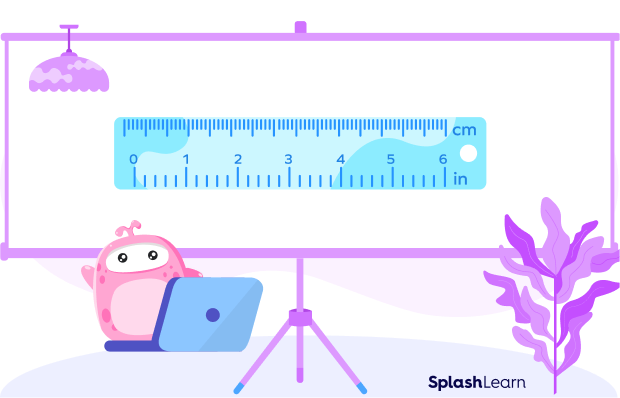
What Is Length?
Measurement of length can be defined as an act of identifying the length of objects in some standard or non-standard units. The skill to measure the length is very important in our everyday life.
Suppose Mathew is going to a store with his friend and he sees a beautiful picture frame that can be placed in his parents’ bedroom. But how would he tell them the length of the frame? He can do that if he knows the length in a certain unit, say 3 feet. In the image given below, the length of the picture frame is 3 feet.
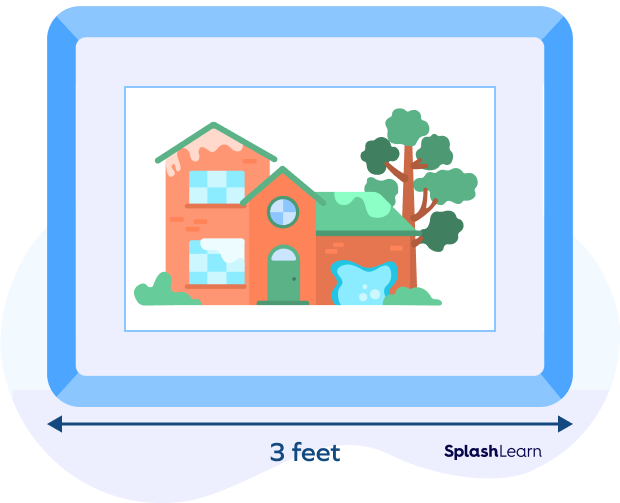
Recommended Games
Units to Measure Length
We can measure the length of an object by using different units like meter, centimeters, feet, inches or by using a handspan, foot-span, etc. We classify the units to measure length into two types:
1. Non-standard units of measuring length
The non standard units do not have any fixed measurement in numbers. The measurements vary from person to person and object to object.
For example, a kid and his father are measuring a painting using their hands. So, the length they will get will be different because the handspan of a kid is usually smaller than that of an adult. Some of the non-standard units of length are handspan, foot span, finger width, a thread or a rope, etc.
A. Handspan
Handspan is the maximum distance between the tips of the thumb and the little finger. It is generally about 8 inches, but it depends on your hand.
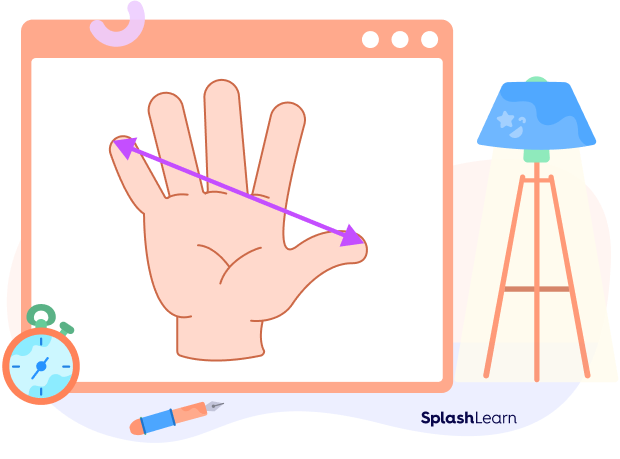
B. Foot-span
The foot-span is defined as the distance between the point of the toe and the heel of the foot.
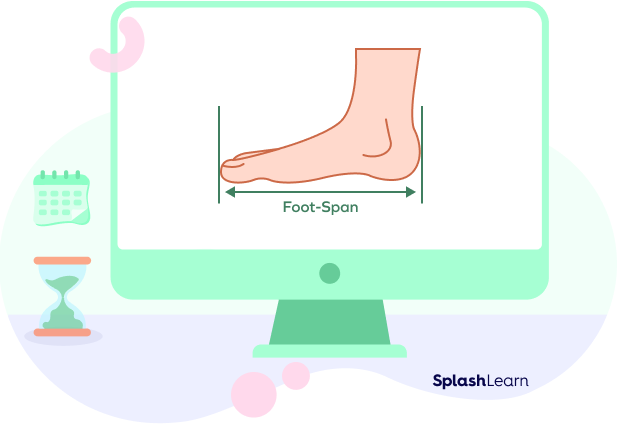
2. Standard units of measuring length
Standard units are predefined and they do not change from person to person or object to object. Suppose, there are two people measuring the length of a pencil with a ruler. If they use the standard units, they will get the same value. Some examples of measurement of length using standard units are centimeters, meters, kilometers, inches, feet, yards, etc.
We can divide the standard units of measuring length into two types:
A. Metric System
The metric system includes kilometer, hectometer, decameter, meter, decimeter, centimeter, and millimeter. There is a relationship between these units. The base unit is meters. The relationship of every other unit with the base unit (meters) is given below:
- 1 kilometer (km) = 1000 meters (m)
- 1 hectometer (hm) = 100 m
- 1 decameter (dam) = 10 m
- 1 decimeter (dm) = 1/10 m = 0.1 m
- 1 centimeter (cm) = 1/100 m = 0.01 m
- 1 millimeter (mm) = 1/1000 m = 0.001 m
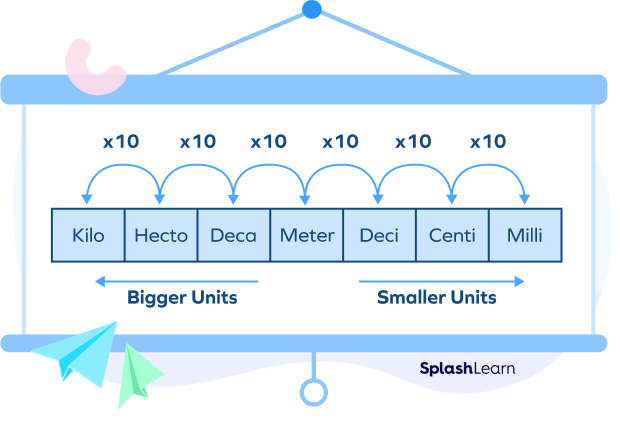
B. Imperial System
The imperial system includes feet, yard, inches, etc. The relation is given by:
1 yard = 3 feet
1 feet = 12 inches
Metric to Imperial System
1 m = 3.28 feet
1 m = 39.37 inches
Imperial to Metric System
1 inch = 2.54 cm
1 foot = 30.48 cm
1 foot = 0.3048 m
Recommended Worksheets
S.I. Unit of Length
The S.I. unit is an international system of measurements that are used universally in technical and scientific research to avoid the confusion with the units. The S.I unit to measure the length is given in meter (m). The meter is the base unit of length.
Tools used for Measurement of Length
1. Rulers
Rulers have straight edges and are stiff. One side of the ruler has markings in inches and the other side has markings in centimeters. Rulers are good to use for shorter lengths like the length of a pencil or notebook.
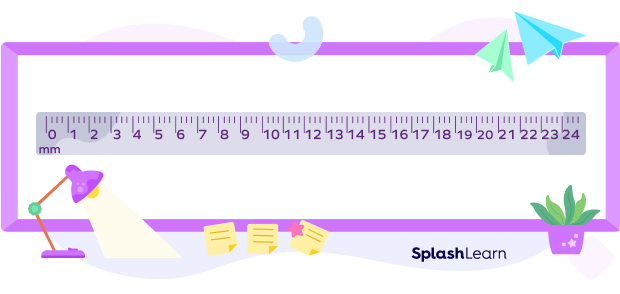
2. Tape Measures
Tape measures are flexible straight edges with graduated markings. Since most tape measures only measure one unit system (U.S. customary or metric), you’ll need to find one that uses the unit system you need. Since these tools can bend, they’re good to use when measuring the total length of an object that exists in more than one dimension (e.g., waist measurements, the circumference of a wood block, etc.).
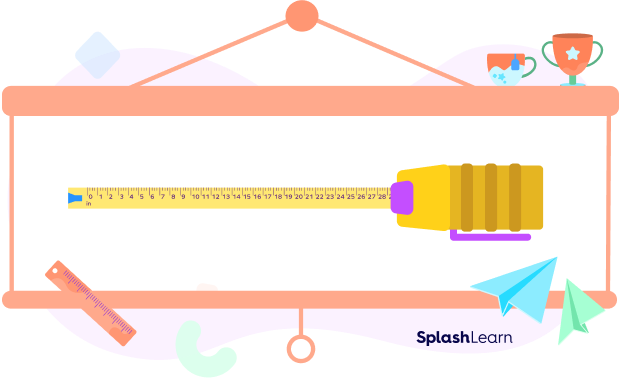
3. Meter Sticks
Meter sticks and yardsticks are the same in construction and length. Both have straight edges and are stiff. Meter sticks measure all lengths up to 1 meter, and yardsticks measure all lengths up to 3 feet.
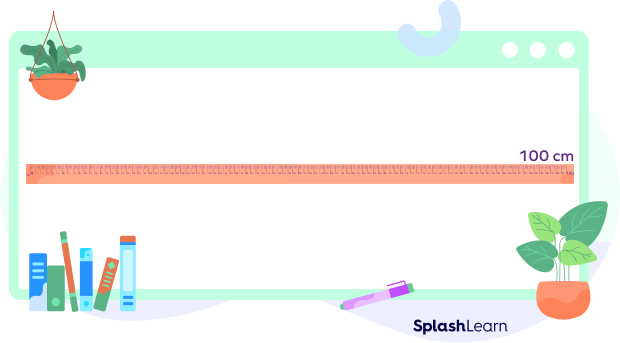
4. Odometers
Odometers are tools that measure long lengths traveled by vehicles, like cars and bicycles. Pedometers measure long lengths traveled by a human or other living creature as it walks. These tools are good for measuring miles and kilometers, but they are calibrated by professionals and work without hands-on involvement from the user.

How to Measure Length?
There are two sides of a ruler. On one side, we see centimeters/millimeters and on the other side, we see inches. The following steps are required to measure the length of an object:
Step 1: Choose the unit in which you want to measure the length of an object. If you want a value in cm/mm, then use the cm/mm side of the ruler. If you want the value in inches, then use the inches side of the ruler.
Step 2: Find 0 mark on one end of the ruler. Align the zero mark with the starting edge of the object to be measured.
Step 3: Look at the endpoint of the object and note the value. For example, in the below figure, the length of the pencil is from 0 to 10 cm.
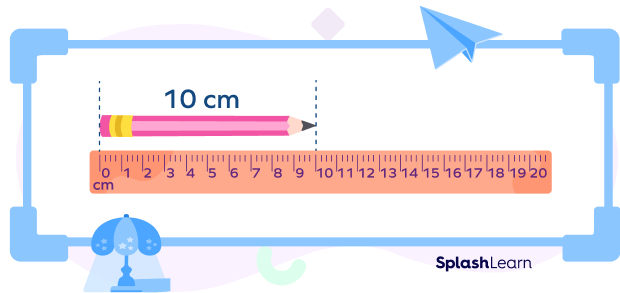
Solved Examples on Measurement of Length
Example 1: What is the length of the window (in feet) if a 12-inch ruler is placed 4 times in line?
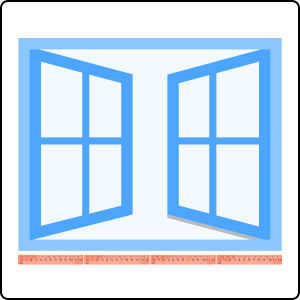
Solution: A 12-inch ruler is placed 4 times.
So, length of the window is 12 ✕ 4 = 48 inches = 4 feet.
Example 2: What should be the minimum length(in cm) of a pencil box so that a pen of length 450 mm can fit inside it?
Solution: 1 mm = $\frac{1}{10}$ cm
450 mm = 45 cm
The minimum length of a pencil box should be more than 45 cm only.
Example 3: The gate is 3 feet long. How many inches is it long?
Solution: 1 feet = 12 inches
3 feet = 3 ✕ 12 = 36 inches
Example 4: Olive walked 100 yards from her house to the bookstore and Mark walked 300 feet from her house to her friend’s house, who walked more?
Solution: 1 yard = 3 feet
100 yards = 300 feet
So, Olive walked 300 feet and Mark also walked 300 feet.
Both walked the same distance.
Practice Problems on Measurement of Length
Measurement of Length - Definition with Examples
Kim started walking from her house. She traveled 2 km from her house to the park, 3000 m from park to the club and 10,000 cm from club to her house. How much distance did she travel in all (in m)?
Total distance = 2 km + 3000 m + 10,000 cm = 2000 m + 3000 m + 100 m = 5100 m
How many erasers of length 30 mm can you fit in a 13 cm box if they are placed in a straight line one after the other?
Length of an eraser = 30 mm = 3 cm
13$\div$3 = 4.33
We can only place 4 erasers.
Help Catherine in finding the length of the pencil?
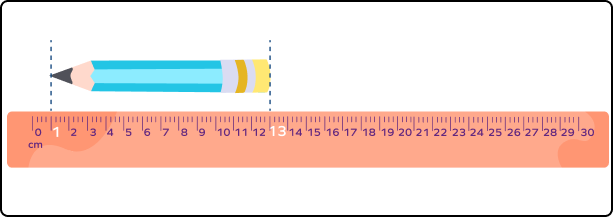
The length of a pencil = 13 cm - 1cm = 12 cm
Frequently Asked Questions on Measurement of Length
What is the smallest measurement of length using rulers?
The smallest measurement of length is the millimeter. We use millimeters if an object is very small, say length of our nails, etc,
What is the SI Unit used for measurement of length of an object?
The SI unit to measure the length of an object is meters, which is denoted by “m”. It is also the base unit.
What are the two methods to measure the length of an object?
The two methods to measure the length of an object are:
1. Direct method, in which we use standard units of measurement like meters, yards, inches, etc.
2. Indirect method, in which we use non-standard units like foot-span, handspan, etc.


































